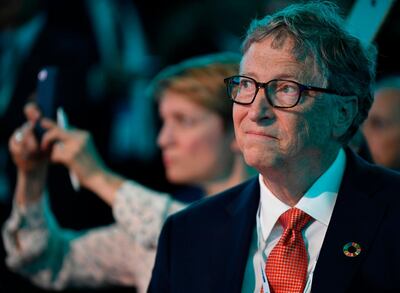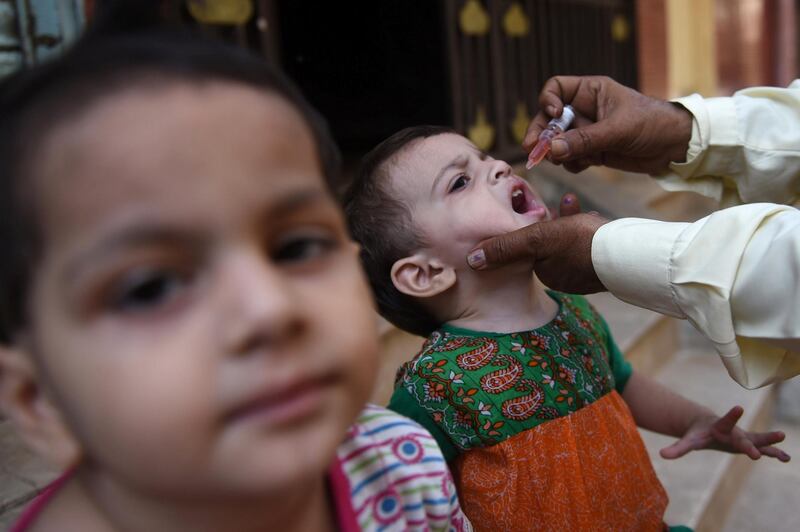In 2011, my wife Melinda and I began working with His Highness Sheikh Mohammed bin Zayed on a big global health project: We wanted to eradicate polio and ensure that all children were immunised against it and other diseases.
Seven years later, polio is on the verge of eradication. The world has only witnessed 18 new cases of wild polio in 2018, and that’s in no small part thanks to the generosity of the UAE and its support to get vaccines to children in hard-to-reach parts of Pakistan.
The UAE has also been an effective ally in the fight against other deadly and debilitating diseases that affect the world’s poorest people, such as malaria, river blindness, and lymphatic filariasis. In December 2018, the UAE will host another major global health meeting in Abu Dhabi in partnership with Gavi, the Vaccine Alliance – where health leaders from around the world will gather to take stock of immunisation progress and consider how vaccines can best be used to save lives and strengthen communities.
The world has changed a lot over the last half century, but arguably the biggest – and best – change is that there are now far, far fewer people living in extreme poverty than there were 50 years ago.
In 1966, half the world’s population was living on less than $1.90/day (adjusted for inflation). As of 2017, it was 9 per cent.
This reduction of global poverty is something that's always made me optimistic about the world − but now there's something that worries me too. New data show that the fight against suffering may be on verge of stalling in sub-Saharan Africa.
Each year, our foundation releases a report on the state of global poverty, and for the first time, we’ve found that the number of people living in extreme poverty might stop declining and may even start growing again. That’s because the poorest corners of the world, most of which happen to be in Africa, are experiencing much faster population growth than everywhere else.

Africa is expected to account for half the world’s total population growth by 2050. Most countries in sub-Saharan Africa are driving poverty rates down, but a few big ones aren’t, meaning that more children will be born into the most challenging conditions.
By the mid-century mark, 40 per cent of the extremely poor people in the world will live in just two countries: the Democratic Republic of Congo and Nigeria. Together, those two nations will be home to almost 600 million people – more than nine times the current population of the Arabian Peninsula.
Some people worry about what this large group of very young, very poor people will do when they are denied opportunities. Will they cause insecurity, instability and mass migration?
We must think just as much about what they will accomplish if they have access to opportunities − if they get an education, build businesses, dream up inventions and grow the global economy, the way that bright young men and women from around the world have been doing for generations.
So what is the key to providing opportunities in the places where they are currently lacking? Investing in the health and education of young people. These human capital investments are not the only ingredient to healthy economies, but they have played a pivotal role in lifting nations like China and India out of poverty.
Economic models show that they can do the same for Africa, growing the continent’s GDP by nearly 90 per cent by 2050.
There are two areas, in particular, where we need the world’s help.
_____________
Read more:
Bill Gates thanks UAE for role in the fight to end world poverty
_____________
First is making sure children do not just survive but thrive. Most African countries have participated in the global revolution in child survival. Rwanda, just a few years removed from genocide, has built an effective health system from the ground up and seen the steepest drop in child mortality ever recorded. The next step is making sure children can lead productive lives.
One third of African children are stunted, which means their brains and bodies aren’t developing fully. But there are proven strategies solving the stunting problem. For example, China was able to reduce stunting by nearly 70 per cent between 1990 and 2010, in large part because of new agricultural technologies that increased productivity. We must now make sure these technologies are adapted to the African context so people on that continent can enjoy better health and nutrition.
Second is education. Since 2000, the number of African children enrolled in primary school has increased from 60 million to 150 million, and the number of girls in school is now virtually equal to the number of boys. The next step is improving the quality of the education all students receive.
Low-income countries can achieve excellent results in their schools, as Vietnam’s results on international tests prove. We must learn lessons from success stories like Vietnam and transfer them globally so that all students benefit.
For most of human history, poverty was thought to be an inevitable part of the human condition, something that had always – and would always – exist. Now, we have the opportunity to prove otherwise.
Every child deserves a chance to have a productive life, no matter where they are born.
Whether more children in poor countries have that chance depends on the choices and investments we make today. I am hopeful we will make the right ones.






